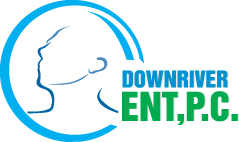Thyroid Surgery
Thyroidectomy is the removal of all or part of your thyroid gland. Your thyroid is a butterfly-shaped gland located at the base of your neck. It produces hormones that regulate every aspect of your metabolism, from your heart rate to how quickly you burn calories.
Thyroidectomy is used to treat thyroid disorders, such as cancer, noncancerous enlargement of the thyroid (goiter) and overactive thyroid (hyperthyroidism).
How much of your thyroid gland is removed during thyroidectomy depends on the reason for surgery. If only a portion is removed (partial thyroidectomy), your thyroid may be able to function normally after surgery. If your entire thyroid is removed (total thyroidectomy), you need daily treatment with thyroid hormone to replace your thyroid’s natural function.
Risks
Thyroidectomy is generally a safe procedure. But as with any surgery, thyroidectomy carries a risk of complications. There is a horizontal incision over the thyroid gland. The size of the incision will depend on the size of the thyroid gland and whether the entire gland will be taken out but generally will be at least two inches or five centimeters long. The surgery is done entirely under general anesthesia.
Potential complications include:
- Bleeding
- Airway obstruction caused by bleeding
- Permanent hoarse or weak voice due to nerve damage
- Damage to the four small glands located behind your thyroid (parathyroid glands), which can lead to hypoparathyroidism, resulting in abnormally low calcium levels in your blood and bones and an increased amount of phosphorus in your blood.
Post-operative care
You will wake up in the recovery room. There will likely be a drain (rubber tubing) coming from another tiny incision in the neck. This helps to remove blood and fluid from the area so it does not accumulate. You will be transferred then your room for further care. Blood will be drawn throughout your hospital stay and if total thyroidectomy is done your calcium level may need to be checked as many as three times a day. Generally, after 24 hours the drain will be removed and you will go home after that. Some patients require further monitoring of the drain or their calcium levels.
After a thyroidectomy, you may experience neck pain and a hoarse or weak voice. This doesn’t necessarily mean there’s permanent damage to the nerve that controls your vocal cords. These symptoms are often temporary and may be due to irritation from the breathing tube (endotracheal tube) that’s inserted into your windpipe (trachea) during surgery, or as a result of nerve irritation caused by the surgery.
You’ll be able to eat and drink as usual after surgery. When you go home, you can usually return to your regular activities, often within a few weeks. Talk to your doctor about specific activity restrictions.
If you had a total thyroidectomy, you will need to take thyroid hormone supplementation daily. If a partial thyroidectomy was done then the remaining gland will be able to compensate and you will not need hormone supplementation.
Follow post-operative care instructions given to you at the hospital. You will typically follow-up with your surgeon in 1 week for suture removal and to discuss the pathology results of the excised thyroid gland.

